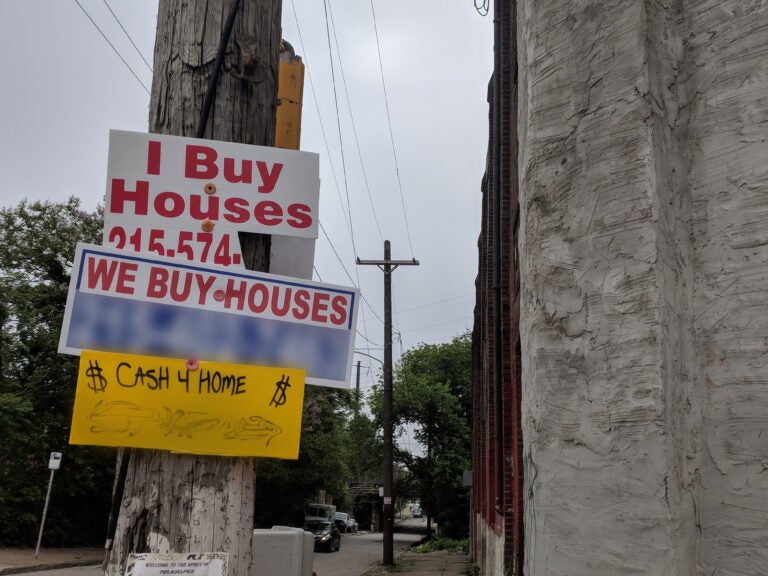‘We buy houses’: Philly Council targets real estate scammers with bill
A bill introduced by Philly City Councilmember Allan Domb and co-sponsors would create protections against scammers plastering the city with 'We buy houses' signs.

Signs from residential wholesale buyers can be found all over Philadelphia, advertising fast cash for homes. (Courtesy of Community Legal Services)
As property values in some Philadelphia neighborhoods soar, longtime residents are bombarded with offers for “quick cash” sales from aggressive buyers – the same ones who plaster our city with “We Buy Houses” signs, make unsolicited calls to homeowners, and send piles of letters and postcards with personal-sounding notes.
Those who fall for these ads often realize too late that they have gotten a bad deal, or worse, end up with a legal nightmare on their hands.
Residential property wholesalers use predatory tactics and target our most vulnerable residents to profit from the equity those residents have built over the years. Wholesalers go into the homes of seniors and pressure them to sign sales contracts on the spot. They convince those whose homes need repairs or are at risk of foreclosure to sell for well under market value, even when residents do not want to leave their communities and might have options to save their homes.
This week, City Council is poised to take action by passing groundbreaking legislation that would curb the most aggressive and predatory tactics of these residential property wholesalers. The bill would protect vulnerable homeowners from being ripped off, preserve intergenerational wealth in our neighborhoods and protect our communities from unscrupulous wholesalers targeting homeowners’ hard-fought equity.
The bill, introduced by Councilmember Allan Domb, along with 10 co-sponsors, would create several important protections for homeowners:
- The bill would create a Do Not Call list so homeowners could opt out of receiving these solicitations to sell their house. Wholesalers who continue to harass homeowners after being put on notice that a homeowner does not want to be contacted would be subject to fines.
- The bill would require wholesalers (like many other professionals operating in the city) to be licensed, and to follow a simple but important set of ethical guidelines. Wholesalers would need to provide an actual person’s name when applying for the license, adding important transparency to an industry that often operates anonymously behind layers of LLCs. Wholesalers who operate without a license would be subject to fines, and homeowners who sold their homes through unlicensed wholesalers would have new options to save their homes.
- Wholesalers would be required to provide homeowners with a Seller’s Bill of Rights. For homeowners who do not want to sell their homes but feel like they have no choice, the document would provide clear guidance about resources designed to assist homeowners. For those who do want to sell, the document would also include information about how to get a fair price for what is often a person’s most valuable asset.
A campaign to #saveourhomes
Today, homeowners, especially in communities of color, are facing pressing concerns about delayed home repairs, mortgages, employment, and the uncertainty of the COVID-19 pandemic. Wholesalers take advantage of this uncertainty to send official-sounding notices to vulnerable homeowners who are worried about keeping their homes.
A senior homeowner in Strawberry Mansion, for example, was so concerned a wholesaler was going to take her house that she requested the assistance of the Strawberry Mansion CDC to contact the wholesaler and offer to pay them to keep them off her back. This is just one of many stories of the confusion and frustration homeowners tell when they talk about predatory homebuying.
Of course, legislation will not solve all the problems created by these practices.
Communities like Strawberry Mansion decided to take on predatory homebuyers with a variety of approaches, including education and social media campaigns — through the hashtags #notforsale, #saveourhomes, #stopforcedsales, and #mansionstrong.
Community Legal Services has spent the last year designing various educational materials to distribute throughout neighborhoods and online. These campaigns have been focused on informing homeowners about the city’s programs that are designed to help — such as the Basic Systems Repair Program for those who are worried about affording important repairs, and income-based property tax payments for those at risk of tax foreclosure— as well as giving homeowners who want to sell their home information about how to get a fair deal.
To be fair, there is plenty of responsible investment happening in Philadelphia.
Many investors already follow strict ethical rules when working with residents who are considering selling their properties. Holding unregulated and unlicensed wholesalers to the same standards of honesty and ethics benefits not only residents, but the investors who are acting ethically when buying and improving properties.
CLS and Strawberry Mansion CDC applaud City Council for its continued commitment to help homeowners and ensure that Philadelphians can continue to build intergenerational wealth, stay in their homes and communities, and that homeowners who do want to sell their homes are the ones who keep the equity they have earned.
Kate Dugan is an attorney with Community Legal Services’ Homeownership and Consumer Rights Unit.
Tonnetta Graham is the President of the Strawberry Mansion Community Development Corporation.

Subscribe to PlanPhilly
WHYY is your source for fact-based, in-depth journalism and information. As a nonprofit organization, we rely on financial support from readers like you. Please give today.







